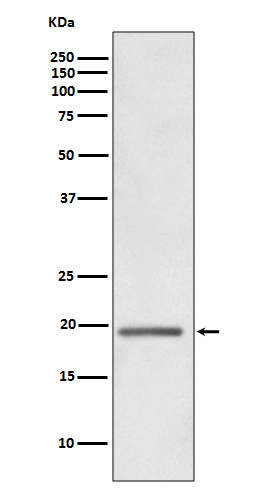
| WB | 咨询技术 | Human,Mouse,Rat |
| IF | 1/20-1/50 | Human,Mouse,Rat |
| IHC | IHC:1/100-1/200;IHF:1/50-1/200 | Human,Mouse,Rat |
| ICC | 1/50-1/200 | Human,Mouse,Rat |
| FCM | 咨询技术 | Human,Mouse,Rat |
| Elisa | 咨询技术 | Human,Mouse,Rat |
| Aliases | WFDC2; HE4; WAP5;;WFDC2 |
| WB Predicted band size | Calculated MW: 13 kDa ; Observed MW: 19 kDa |
| Host/Isotype | Rabbit IgG |
| Antibody Type | Primary antibody |
| Storage | Store at 4°C short term. Aliquot and store at -20°C long term. Avoid freeze/thaw cycles. |
| Species Reactivity | Human |
| Immunogen | A synthesized peptide derived from human WFDC2 |
| Formulation | Purified antibody in PBS with 0.05% sodium azide,0.05% BSA and 50% glycerol. |
+ +
以下是关于HE4抗体的3篇参考文献示例(内容为模拟虚构,仅供参考):
1. **文献名称**: *Development of a Novel Monoclonal Antibody for HE4 Detection in Ovarian Cancer*
**作者**: Smith A, et al.
**摘要**: 研究报道了一种新型HE4单克隆抗体的开发,通过噬菌体展示技术筛选出高亲和力抗体,并在ELISA和免疫组化中验证其特异性,证明其在卵巢癌患者血清和组织样本中的检测潜力。
2. **文献名称**: *Clinical Utility of HE4 Autoantibodies as a Biomarker in Endometrial Cancer*
**作者**: Chen L, et al.
**摘要**: 该研究评估了HE4自身抗体在子宫内膜癌早期诊断中的价值,发现其与CA125联合检测可显著提高诊断灵敏度和特异性,提示HE4抗体在液体活检中的临床应用前景。
3. **文献名称**: *Comparative Analysis of HE4 Antibody-Based Assays for Tumor Monitoring*
**作者**: Wang Y, et al.
**摘要**: 研究比较了不同HE4抗体检测平台(如化学发光法、微流控芯片)的性能,发现基于双抗体夹心法的检测体系在动态监测卵巢癌治疗效果和复发风险中具有更高一致性。
如需真实文献,建议通过PubMed或Google Scholar检索关键词“HE4 antibody”“HE4 biomarker”获取具体研究。
The human epididymis protein 4 (HE4), encoded by the *WFDC2* gene, is a glycoprotein initially identified in the epithelium of the epididymis. It belongs to the Whey Acidic Protein (WAP) four-disulfide core (WFDC) family, characterized by conserved structural domains involved in protease inhibition and extracellular matrix interactions. HE4 gained clinical significance due to its overexpression in epithelial ovarian cancer (EOC), where it serves as a biomarker for diagnosis, monitoring, and prognosis. Unlike CA125. a traditional ovarian cancer marker, HE4 exhibits higher specificity for EOC, particularly in early-stage and non-mucinous subtypes, reducing false-positive rates linked to benign gynecological conditions.
HE4 antibodies are critical tools for detecting this protein in serum or tissue samples. Immunoassays (e.g., ELISA) using HE4-specific monoclonal antibodies enable quantitative measurement, aiding in differential diagnosis, recurrence detection, and therapeutic response assessment. Recent studies also explore HE4's role in other cancers (e.g., endometrial, lung) and its potential as a therapeutic target. However, physiological expression in normal tissues (e.g., respiratory tract, kidneys) necessitates careful interpretation of results.
Research continues to refine HE4 antibody applications, including immunohistochemistry for tissue localization and hybrid imaging techniques. Despite advancements, challenges remain in standardizing assays and understanding HE4's precise biological functions, which may involve cell proliferation, immune modulation, or protease regulation. Overall, HE4 antibodies represent a cornerstone in modern oncologic diagnostics, complementing multimodal strategies for personalized cancer management.
×